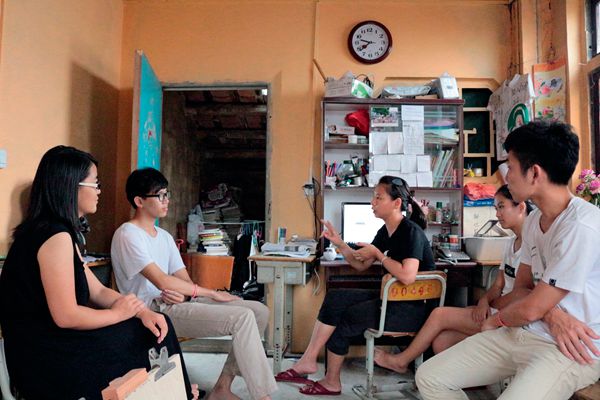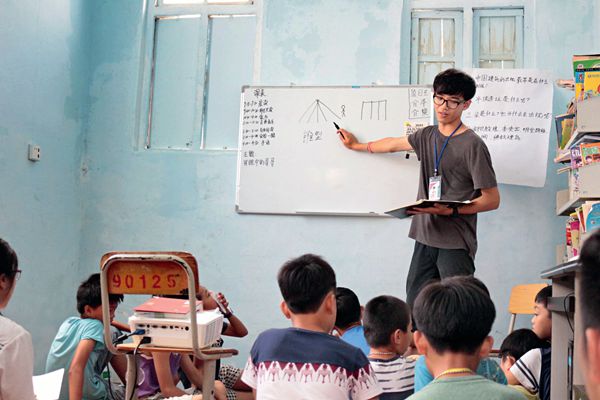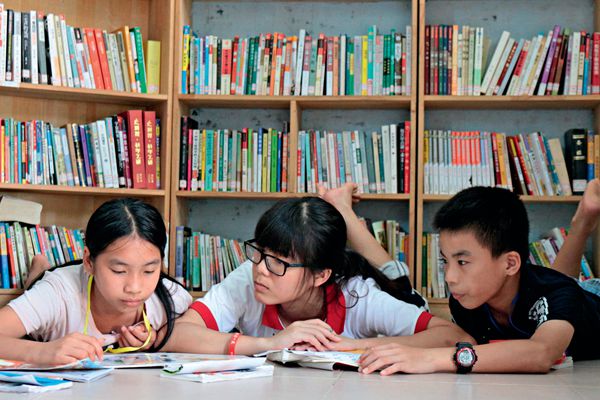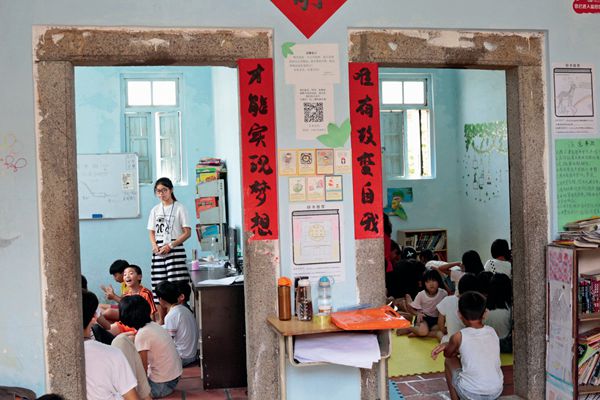Zhuzhu and Her Village Library
By staff reporter GONG HAN
AFTER being a migrant worker for over 10 years, Wu Lizhu, nicknamed Zhuzhu, returned to her hometown in Lanbiao Village, Jieyang City, Guangdong Province, and set up a library free of charge for local kids. This was two years ago. Before that, she had spent four years working with a nonprofit organization in Beijing which provided assistance to the children of migrant workers and women’s co-operatives. “When I returned to my hometown, it grieved me to find teenagers leaving home to make a living as I did a decade ago,” Zhuzhu said.
From Migrant Worker to Volunteer
Zhuzhu started her library in a two-story house in her village, a space of about 60 square meters. It is a cozy place, simply furnished, with children’s books – mostly picture books – on wooden bookshelves. When she first moved in, however, the doors were practically falling off their hinges and the place was very shabby. With the help of several local children, she cleaned the rooms, painted the walls, and put up decorations.

Zhuzhu (third left) and the volunteers discuss details of their activities.
Every afternoon during the summer vacation, kids wait outside for the library to open. Some of them come to ask Zhuzhu when the summer camp will start. The summer camp is arranged by a nonprofit organization dedicated to improving children’s reading and writing skills in underdeveloped regions. This year, the summer camp brings children closer to local customs, culture, and artisans.
Lanbiao has a population of 30,000 or more. Almost all families there have multiple children – people of Zhuzhu’s age normally have between three and seven siblings – and people don’t really place much importance on their children’s education. Statistics show that just over half of those who complete junior high school choose to further their study, while the other half decide to migrate away to seek employment in big cities. The ones who stay in the village and attend school are normally left behind by their parents working out of town.

A volunteer gives a lecture on ancient architecture.
Zhuzhu was one of the dropouts. In 2003, before graduating from junior high school she left the village and started working for a living. This was considered quite normal in certain rural areas of Guangdong. “Back then, my parents, like others, thought it was enough for girls just to know some basic Chinese characters in order to avoid being deceived and to enable us to read traffic instructions,” recalled Zhuzhu.
She had a lot of jobs – a labor in a plastics plant, salesgirl in boutiques and clothes shops in the city of Dongguan, and a waitress in the city of Guangzhou. Her experience as a migrant worker broadened her horizons but also puzzled her.
In 2009, Zhuzhu heard about a non-profit agency established by migrant workers in Beijing that provides skills training and assistance for fellow migrant workers from the countryside. Determined to get involved, she volunteered at the agency and then, six months later, received skills training. After completing her training, she stayed on, helping to provide assistance and advice to the children of migrant workers and manage the affairs of a women’s cooperative.
“This experience had a great influence on me. Before going there, I had little self-confidence, but during my time there, it occurred to me that migrant workers from the countryside could do so many things in the cities. I was inspired,” said Zhuzhu.
Shortly after she went back home, Zhuzhu volunteered at Lanbiao School. She shared her training experiences with kids there and also gave sex education classes. “During the sex education classes, some students lowered their heads and others tittered with embarrassment,” Zhuzhu remembers. “Some kids stopped calling me ‘Sister’ and replaced it with ‘Miss Gross.’ Some even told me to my face how crazy it was to publicly discuss sex in the classroom; but there were also several senior high students who came to our class to listen.”
Zhuzhu’s candidness made children want to be friends with her. Children would go to her whenever they had quarrels with their parents, dropped out of school or had relationship problems. She found out that local kids were smart and outgoing, but had nothing to do in their leisure time. Normally they watched TV at home or went to video game arcades. Those from better-off families would usually get addicted to cellphone games.
This knowledge promoted Zhuzhu to set up a free library in the village.
A Free, Public Space
Zhuzhu had nothing in her pocket except two credit cards, so how did she manage to establish the library?
Initially, she posted a message on her WeChat Moments and soon afterwards, some of her friends started donating books. A man from her village who had become a young migrant worker straight out of junior high school, donated a year’s rent. He said he used to dismiss school as useless, but after seeing more of the outside world, he really wanted to do something for school children back in the village, especially something related to culture and education.

Children read and study together at Zhuzhu’s library.
The principal of Lanbiao School was also supportive and provided Zhuzhu with some desks and chairs. Teachers from Sun Yat-sen University, who came to volunteer in the village, donated two bookshelves and children’s books. Zhuzhu also contacted a foundation in Guangzhou which also sent her over 800 books.
During this time, Zhuzhu had no earnings, and in addition to her own living expenses she paid for miscellaneous costs for the project. At a point her credit card debt came to tens of thousands of yuan. She had to resort to borrowing to pay her debts, but fortunately always managed to get by. Zhuzhu jokes that the payment due date each month was like a pending death sentence, then luckily she would survive and be reborn.
Her biggest pressure came from the objections raised by her family and the doubt of fellow villagers. Her peers had either gone to the cities to find work or had got married and had babies. Who, especially one from a poor family, would do non-profit work? How could a young woman handle all these things? Who would use the library in such a poor village?
Zhuzhu ignored these objections. The children in support of her established a group to help find a suitable venue and deal with procurement and decorating. They also drew up some regulations for the library’s operation and invited their friends there. Gradually, more and more children started to show up.

Children have different classes at the library.
The library can accommodate around 100 children, some of whom come to do their homework after school or to read in the evenings. At weekends, there are story-telling classes, painting classes, and film viewing events. As the library program expanded, some non-profit organizations dedicated to rural education began to contact Zhuzhu and hold activities in the library. Zhuzhu was very popular, and there were always friends who came to visit her from far and wide. Every time they visited she would organize a salon for her friends to share their different experiences of the outside world with local parents and children.
“As well as reading and doing their homework, I also hope that they could come to me when they are wronged by their parents at home and look for a quiet place to calm down,” Zhuzhu explained. “If they want to sit silently, we won’t disturb them, but if they want to chat with me, then I’d be very happy. This is what I want to provide them with: a free space.”
A Mothers’ Club
As more and more kids started coming to the library, the whole village underwent some subtle changes.
One day, a mother came into the library and asked Zhuzhu shyly, “Are you free? I would like to talk to you about my kid. For some reason she is disobedient and won’t respond to me, whatever I say.” She chatted with Zhuzhu for an hour and got some helpful suggestions.
Gradually, more and more mothers came to chat with Zhuzhu. At their suggestion, Zhuzhu began to run a “mothers’ club.” Some of the women managed their own shops during the day and had nothing to do at night apart from watching TV or playing cards. Some worked on construction sites all day and were very tired after work. All of them, however, were interested in this club and made sure to be there, even on rainy days.
Most of the women were illiterate. Zhuzhu taught them to read first. One woman joyfully told Zhuzhu that ever since she had learned to read and write, the atmosphere in her family had improved. Whenever she had problems with her homework, her daughter would help her; and so would her husband, although he might grumble that she was slow. She was happy about this change.
Zhuzhu also practices yoga and teaches others. “Actually I’m just beginning to learn,” she says, “but they are happy to practice with me even though we mostly just sit there and chat in yoga class.”
She also encourages sex education among mothers. “Some of them are too shy to share this knowledge with their kids. They discuss their own childhood problems and then I teach them how to talk with their own kids.” Zhuzhu encourages women to bring their children to the library to enjoy some parent-child time. She has a lot of ideas for activities: for example, with their mother’s assistance, children can sort mixed beans into different colors.
Some parents were proactive and brought books to donate to the library. Some mothers even brought fried fish and desserts made from Chinese yams.
Changing the Local Concept of Education
Zhuzhu often tells teenagers, “I won’t object if you want to become young migrant workers in big cities, but the outside world is not as good as you imagine.” She shows them pictures of migrant workers’ living spaces and working conditions.
According to Zhuzhu, being a migrant worker helped to realize many of her childhood dreams. For example, she had been longing to live in an apartment, so was happy to find her dorm on the sixth floor. At home her grandma had seldom allowed her to have instant noodles, only half a bag each time, which was never enough, “but it’s exhausting to climb six stories after a long working day and at the end of the month, when I was short of money, I always ate too many instant noodles which made me sick at the thought.”
In May this year, Zhuzhu was given a grant of RMB 50,000 from a non-profit organization to cover her salary and the daily expenses of the library; but she did not list the rent when she applied for the money. “The mothers always offered me money when they came to the library or the club, but I refused. Many villagers sincerely support the library, but I think it’s still too early to get paid for running it,” she explained.
On the evening of June 11, 2016, she posted a message on her WeChat Moments: “Although I don’t know whether I can raise RMB 2,500 for the rent, I still want to try… This time, I hope the villagers can help. No matter how little you are able to give, I hope you can participate.” By noon the next day, she had raised RMB 2,651.98.
Zhuzhu wants to set up a WeChat group to gather together all the people who support her ideas. Then she wants to find 100 people who can donate RMB 50 to the library at the end of each month. She will publish details of how the money is spent and of the activities to be held in the library. It is like crowdfunding. In her mind, “It’s more about connecting people than fund-raising.”
Whether it be the mothers’ club or activities, Zhuzhu always wants to act as a binding force. She wants to change the villagers’ dismissive view of education. When the parents’ concepts are changed, the children will benefit.
As well as working in the library, Zhuzhu also helps poor students in the village who are on the verge of dropping out of school. With her help, 11 found sponsors in a Beijing company. She also wants people in the village to help each other. She looks for these people cautiously: “It must be people who are reliable, those who will not show off about their donation in case they hurt the feelings of the children they are sponsoring.” At present, nine children have found sponsors in the village.
Ever since she returned home to work in the library, what Zhuzhu hears most is: “You helped me realize my dream.” The words come from villagers who used to be migrant workers, volunteers from non-profit organizations, as well as people who have helped her. They all think it is wonderful to build a library full of happiness and hope for rural children.
Services
Economy
- Foreign Companies Opting Out?
- China Set to Hit Target of Eliminating Poverty – An Interview with Bert Hofman, the World Bank’s Country Director for China, Mongolia and Korea
- Trade Protectionism Should Not Be Advocated
- CPC’s “Thought Leadership” Increasingly Important Around the World
- China-Canada Joint Efforts to Address Climate Change
